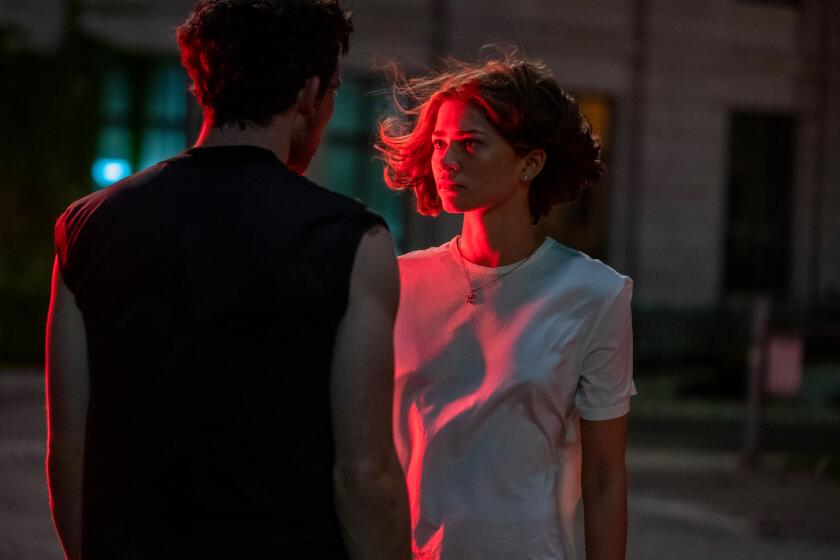When the orgy was in swing
A meat purveyor becomes a sex club entrepreneur: It sounds like a bad joke, but it’s the real-life story of Larry Levenson, a doughy, committed hound whose ‘70s-era hot-to-trot spot Plato’s Retreat on New York’s Upper West Side is the subject of the documentary “American Swing.”
Filmmakers Mathew Kaufman and Jon Hart crank up the disco music, grainy bump-and-grind footage and eyewitness accounts (courtesy of patrons, employees and famous faces such as Buck Henry and Annie Sprinkle) in their effort to sell Plato’s rise as a feel-good, feel-up phenomenon that embodied a revolution. But even a comic spin on grimace-inducing tales of the icky buffet, the “mattress room” (whatever you’re imagining, that’s it) and Levenson’s own buffoonish image as a 10-ladies-a-night player -- “He never read a book,” Al Goldstein cracks -- can’t keep an unexplored sadness from slithering in amid the orgy of upbeat testimonials.
Eventually the buzz kill of tax evasion, rampant prostitution (how did they get in?!) and the AIDS onslaught shuttered Levenson’s public sex Valhalla. And without a “monument to sexual freedom” to glorify, the film treats Levenson’s rapid descent as if someone had turned on the lights at a sex party: scurrying away with pity and irritation that the good times had to end.
-- Robert Abele
“American Swing.” MPAA rating: Unrated. Running time: 1 hour, 21 minutes. At Laemmle Sunset 5, 8000 Sunset Blvd., West Hollywood, (323) 848-3500.
‘C Me’ potential goes unfulfilled
Talk about preaching to the choir. The faith-based drama “C Me Dance” is so dialogue-heavy with citations of Christian doctrine and pronouncements of, literally, biblical proportions, it’s as if the script by Greg Robbins (who also produced, directed and costars) wasn’t so much written as carved in stone with a sledgehammer. It’s fine to know your audience and cater to its entertainment needs, but even the most devout viewer subjected to Robbins’ ham-fisted film might think, “OK, now tell me something I don’t already know.”
That’s not to say this story of Sheri (Christina DeMarco), a terminally ill teenager on a mission to spread God’s word before she dies -- and thereby keep the devil at bay -- is without its potentially inspirational merits. Unfortunately, the movie is so rudimentarily written, acted and directed, and its more earthly concerns painted with such a broad, superficial brush, it’s hard to be convinced of such key story elements as Sheri’s advanced leukemia, her love of ballet and the fact that she and dad Vince (Robbins) are actually father and daughter.
For the record, the text message-like title actually refers to the license plate Sheri plans to get if she lives long enough to drive. Two guesses how that one turns out.
-- Gary Goldstein
“C Me Dance.” MPAA rating: PG for thematic material, some violence and mild language. Running time: 1 hour, 29 minutes. In general release.
Musical panache amid hard times
Christophe Barratier’s “Paris 36,” an irresistible and impeccable period musical set against the political and economic turmoil of France in the mid-’30s, focuses on three very different friends who work at the Chansonia, a seedy red-plush and gilt music hall in an ancient, picturesque neighborhood on the edge of Paris. Gerard Jugnot’s Pigoil is a kindly, stocky, middle-aged stagehand, the solid rock of the theater’s operations; Clovis Cornillac’s Milou is the theater’s handsome young electrician, a fiery leftist; and Kad Merad’s Jacky Jacquet is an exuberant, politically naive entertainer who gives terrible imitations until he discovers his talent for singing.
The Chansonia is preparing for a gala New Year’s Eve show to usher in 1936, which unfortunately will also be its final performance, as in hard times it falls into the ownership of the local godfather, the villainous Galpiat (Bernard-Pierre Donnadieu), a classic man-you-love-to-hate, who becomes a leader in the growing fascist movement. The interplay of the times and of the lives of various individuals involves politics, economics, love, intrigue, treachery, loyalty, heroism, cowardice, comedy and tragedy plus a clutch of wonderfully evocative songs -- songs with terrific panache -- with lyrics by Frank Thomas and music by Reinhardt Wagner makes for an exceptionally rich film.
“Paris 36” has the feel of French screen classics of the ‘30s -- with a tip of the hat to Busby Berkeley in one production number. Tom Stern’s cinematography is superb, as is the meticulous, magical production design of Jean Rabasse. Filmed in sound stages and locations in Prague, “Paris 36” has a beguilingly authentic sound and offers a blend of impassioned sentiment and harsh, even brutal grit.
-- Kevin Thomas
“Paris 36.” MPAA rating: PG-13 for some sexuality and nudity, violence and brief language. Running time: 2 hours. In French with English subtitles. In selected theaters.
Robbing without stealing the heart
Seeming 10 years out of date, the indie comedy “Skills Like This” mixes navel-gazing slackerdom with amateur criminal high jinks to energetic if incoherent effect.
Slouched in his regular burrito-joint booth mourning a failed new play, dispirited writer Max (Spencer Berger, credited with the screenplay) makes the rash decision to rob a nearby bank. To the astonishment of his aimless, obnoxious chum Tom (Brian D. Phelan) and uptight, responsibly dull pal Dave (Gabriel Tigerman), Max finds he’s good at it. Spurred by this newly discovered gift for thievery, Max -- who even woos fresh-faced bank teller (Kerry Knuppe) -- creates a ripple effect, upending his friends’ perceptions of their own dead-end lives.
Too bad all the forced whimsy of this “Bottle Rocket” wannabe feels maniacally scattershot -- like an off night at an improv club -- rather than organically inspired. Director Monty Miranda has cheeriness to spare, but also a tin ear for scene dynamics and comedy. Screenwriter-lead Berger, meanwhile, has a sweet-souled charisma that unfortunately vies for our attention with his screen-commanding Jewfro, a rich hipster bloom so personable that you care more about its fate than any character’s.
-- Robert Abele
“Skills Like This.” MPAA rating: Unrated. Running time: 1 hour, 28 minutes. At Laemmle’s Sunset 5, 8000 Sunset Blvd., West Hollywood, (323) 848-3500, and Playhouse 7 673 E. Colorado Blvd., Pasadena, (626) 844-6500.
Immigrant strays, as does the film
Though it circles some meaningful themes, the Bollywood crossover drama “That Game of Chess” is so unconvincingly played and poorly crafted that it’s checkmate from the first move.
Viresh Sinha, who co-wrote the cliched, simplistic script with Oge Madekwe, stars as Rahul, a kindly Indian engineer who decides to follow his entrepreneurial dreams and immigrate to Los Angeles. Before leaving New Delhi, he promises his concerned, chess-playing father (Alok Nath) the same three things, it’s loftily noted, that Mahatma Gandhi promised his own parents before leaving home: no indulging in alcohol, meat or women. So when Rahul’s first stop upon arriving in America is a lap dance club, you know that promise is out the window.
Rahul’s otherwise auspicious start in L.A. -- computer programming job, nice apartment, friends -- predictably goes south when a troubled office romance drives him into a silly, booze- and cocaine-fueled vortex. Given how smart and grounded Rahul is initially painted, his fall from grace and later path to redemption is ridiculously contrived. Under the inept direction of Raja Bundela, who also costars, the mostly amateurish cast is wildly uneven. Then there are the slapdash editing, head-scratching scene continuity and intrusive music to endure.
What would Gandhi do?
-- Gary Goldstein
“That Game of Chess.” MPAA rating: Unrated. Running time: 1 hour, 35 minutes. In English and Hindi with English subtitles. At Laemmle’s Fallbrook 7, 6731 Fallbrook Ave., West Hills, (818) 340-8710; Naz 8 Cinemas, 6440 E. South St., Lakewood, (562) 866-2444.
Challenges for the female artist
It wasn’t until 1986 that H.W. Janson’s “History of Art,” a widely used textbook, took the bold step of including in its pages representatives of a certain group. The artists granted such acknowledgment for the first time? Women.
The documentary “Who Does She Think She Is?” delivers its fair share of such dispiriting statistics. But its impulse is visionary, not plaintive. Exploring the challenges of being a female artist and, in particular, the thorny balancing act between motherhood and artistic expression, Pamela Tanner Boll and Nancy Kennedy have made a vibrant film.
Following their muse, the five women profiled detonate land mines of guilt and provoke accusations of selfishness. Friends and spouses can’t always see past the either-or equation -- work or family -- that remains a deeply ingrained view of women’s place in the world, even in this so-called postfeminist age. Still, the artists persist. Some of their stories are more resonant than others, but they all illustrate vividly that tragic figures like Camille Claudel and Sylvia Plath are not the only templates for women pursuing a life of creativity.
With its playfully pointed use of archival clips and with its subjects’ striking talents on display, the well-crafted film celebrates courage: It takes guts to resist the constraints of accepted wisdom. Sculptor and painter Maye Torres, who endured a difficult divorce to build a modest yet idyllic life for herself and her sons, says it was not a matter of choosing studio time over family: “It was choosing who I was.”
-- Sheri Linden
“Who Does She Think She Is?” MPAA rating: Unrated. Running time: 1 hour, 24 minutes. At Laemmle’s Music Hall, 9036 Wilshire Blvd., Beverly Hills, (310) 274-6869.
More to Read
Only good movies
Get the Indie Focus newsletter, Mark Olsen's weekly guide to the world of cinema.
You may occasionally receive promotional content from the Los Angeles Times.






